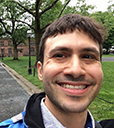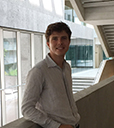Previous Fellows Academic Program
Post – Doctorate Fellowship 2018-19
|
Aloke Prabhu |
|
|---|---|
|
|
Prabhu Aloke Narasinga has his interest in the idea of property and in the regulation of market. His approach is Gandhian in its nature and thus quintessentially considers ethical aspects of market transactions. His PhD thesis explores the dichotomies created by market transaction in balancing the questions of rights and obligations. He takes the framework of Gandhian economics to give perspectives on the frictions created by market. The attempt is to find a narrative of property theory based on moral economics of gandhi by balancing the rights and obligations. As an Edmond J Safra Center for Ethics fellow his work explores the property narratives in the conflicts of social order and liberty in a free market from a gandhian standpoint. Prabhu Aloke Narasinga did his bachelors in History and then in Law from Cochin Universtiy of Science and Technology. He completed his Masters in Business Laws from National Law School of India University before doing his MPhil and PhD from the Center for the Study of Law and Governance, Jawaharlal Nehru University under the supervision of Professor Jaivir Singh. |
|
Amit Gvaryahu |
|
|
|
Amit Gvaryahu is a graduate of the Hebrew University of Jerusalem in Talmud and Classics, where he also completed his MA and PhD. He has also studied at Princeton and Oxford. His research focuses on the interesction between law, finance and religion in late antiquity. He has published papers in the Journal of Jewish Studies, the Jewish Studies Quarterly, and the Harvard Theological Review, and taught at the Hebrew University, the Jewish Theological Seminary of America, and the Pontifical Gregorian University in Rome. |
|
Attila Mráz |
|
|---|---|
|
|
Dr. Attila Mráz is a political theorist. His research revolves around three overarching themes: (1) How could political equality and fundamental participatory rights be reconciled with competent political decision-making? What legal and moral obligations should politicians, the press and citizens have in a democracy to ensure that voters and those who hold public power make competent decisions? (2) What are the justification, content and limits of the fundamental right to political participation? (3) What is the relation between private legal entitlements and political freedoms? How far can the former be used in the service of exercising the latter? If they conflict, which one should prevail? Expounding on this third theme, Dr. Mráz’s research as a Safra Fellow will explore how far businesses should be subjects of political freedoms, and how conflicts between political and economic (fundamental as well as private legal) freedoms should be resolved. Dr. Mráz holds a PhD in political philosophy from Central European University (Budapest). In his doctoral thesis, he focused on the justifications of competence-based restrictions on the right to vote, and argued for the unique potential of liberal democracies to reconcile political equality and the fundamental right to vote with high quality political decision-making. Prior to joining the Edmond J. Safra Center for Ethics, Dr. Mráz was also a Balzan Fellow at New York University, pursued research as a University Associate at the University of Arizona and as an Eötvös Fellow at the University of Warwick, and he was a visiting lecturer at CEU’s Department of Political Science. |
|
Fabrizio Esposito |
|
|---|---|
|
|
Fabrizio Esposito’s research focuses on the relation between legal and economic discourses. His dissertation, Law and Economics United in Diversity: Minimalism, Fairness, and Consumer Welfare in EU Antitrust and Consumer Law, formulates an innovative proposal of mutually beneficial collaboration between economic and legal research. This proposal is grounded in the assessment of a new efficiency hypothesis of the law (“Consumer-Welfare Hypothesis”), where the maximand is consumer welfare and not total welfare like in Posner’s original one. The Consumer-Welfare Hypothesis has remarkable economic pedigree, bridges the gap between efficiency and fairness and has a superior explanatory power of the legal reasoning in EU antitrust and consumer law. At the Safra Center, Fabrizio will focus mainly on the contribution of his previous research to contract theory and on the dissemination of his proposal of collaboration between legal and economic research. He will explore in particular the relation between the Consumer Welfare Hypothesis, Gordley’s fairness theory, transfer theory and Dagan and Heller’s choice theory of contracts. Fabrizio has published in various international journals on a wide range of topics, spacing between the relation of behavioural sciences with consumer policy at the theoretical level and in the EU as well as their impact on the economics of law, the use of economic concepts in the analysis of proportionality reasoning and their relevance in legal reasoning with a particular focus on EU law. With Professors Micklitz and Sibony, Fabrizio has co-edited the forthcoming Research Handbook in Consumer Law (Edward Elgar), he is also invited guest editor for a special issue of the Argentinian legal theory journal Discusiones and has been in charge of the legal theory section of the European Journal of Legal Studies. Most of his publications are available on SSRN, academia.edu and researchgate. Occasionally, he tweets as @espositofabriz. Fabrizio holds a Combined Bachelor and Master of Sciences in Law from Bocconi University and an LL.M. from the European University Institute, where he is expected to defend his dissertation before joining the Center. He has been a Visiting Scholar at the University of Helsinki and a Global Fellow at the Catholic University of Louvain. Before opting for the academic life, Fabrizio has practiced law as a trainee in the Italian branch of a leading British law firm for two years. |
|
Giacomo Tagiuri |
|
|---|---|
|
|
Giacomo Tagiuri received his Ph.D. in Legal Studies from Bocconi University (2018), with a dissertation studying the impact of EU integration on the social and cultural dimension of market regulation. During his doctorate, Giacomo spent a year at New York University as a visiting doctoral researcher in the JSD program. Giacomo’s research and education are interdisciplinary. He holds degrees in Law from the University of Bologna and in European Studies and International Economics from the Johns Hopkins’ School of Advanced International Studies (SAIS) in Washington. His current research draws from law as well as political economy, sociology and the history of ideas to interrogate both theoretical and empirical questions around the relationship between markets, culture, and legal regulation. At Safra, Giacomo will work on a monograph derived from his dissertation and on a theoretical paper investigating the political and ethical implications of claims to shape culturally responsive markets through regulation. |
|
Mateusz Grochowski |
|
|---|---|
|
|
Mateusz Grochowski holds an LL.M. degree from Yale Law School and a Ph.D. from the Institute of Law Studies of the Polish Academy of Sciences. His interests focus on the theory of contract law, especially the emergence of rules governing contracts in contemporary society. Within this sphere, he is particularly interested in the impact of new technologies (such as blockchain and algorithmic analysis of big data) on contract law phenomena. In his research he also addresses contract law as a sphere of ethical concerns, with special regard to the intersections between contract law and fundamental rights. Prior to joining the Safra Center, he has worked as a research affiliate at the European University Institute, a lecturer and teacher at the University of Trento, Italy, and a visiting researcher at Fordham Law School, New York. He has been also employed at the Office of Studies and Analyses of the Supreme Court of Poland. He holds the Professor Zbigniew Radwański Memorial Prize for the best Ph.D. dissertation in private law, as well as scholarships for outstanding young researchers from the Ministry of Science and Higher Education of Poland, the Foundation for Polish Science, and the Polish National Science Center. While at the Safra Center he is also a Fox International Fellow (Yale Law School). During his stay at TAU he will be working on the self-regulatory schemes of and contract governance in virtual marketplaces, with particular regard to online intermediary platforms in the sharing economy. |
|
Mickey Zar |
|
|---|---|
|
|
Mickey earned her LL.B. (2009), LL.M. (2014, cum laude) and Ph.D. (2018) in law, and her B.A. in Linguistics (2002, cum laude), and Literature (2002, summa cum laude), all from Tel Aviv University. Her Dissertation, "'Plenty to Hide': Resistance to Surveillance as a political action", written under the supervision of Prof. Michael Birnhack, explores the political nature of the right to privacy, focusing on digital activism, mainly non-institutional forms of resistance to surveillance. Her Research takes two complementary approaches to the challenge of linking the concept of the political with the concepts of privacy and individuality that are usually associated with the private arena, and therefore not sufficiently recognized as political concepts. One is a theoretical analysis of the political foundations of the concept of privacy, and the second is an analysis of acts of resistance to surveillance, which demonstrate "privacy in action". Mickey's previous work explored normalizing effects of data mining and profiling practices and the connection between privacy and identity. While at the Safra center, she intends to study digital "piracy" practices and the connections between virtual property offenses and piracy in its preliminary sense, as a crime against humanity. |
|
Ohad Somech |
|
|---|---|
|
|
Ohad received his PhD from the Tel Aviv University faculty of law. His dissertation, ‘The Right of Contractual Regret: A Psychological Perspective’, explored the relations between the parties’ emotions and the right to regret in modern contact law and theory. Ohad also holds an LL.B. (Cum Laude) and a B.A in psychology from Tel-Aviv University and an LL.M. (1st in Class) from The European Program in Law and Economics (EMLE). Before joining the Safra center Ohad was a post-doctoral fellow at the Science-Po Law School where he explored the relationship between emotions, choice, and legal responsibility. His research interests include contract law and theory, private law theory, law & psychology, behavioral law and economics, and legal philosophy. Ohad’s research at the Safra Center focus on the relations between the idea of voluntariness in consumer contracts, the role of emotions as motivating and guiding consumer behavior, and the shape and boundaries of contractual responsibility. |
|
Theodosia Stavroulaki |
|
|---|---|
|
|
Theodosia Stavroulaki’s core research agenda lies in the intersection between antitrust law, economic regulation and public policy. Aiming to explore the challenges antitrust enforcers face when applying competition law in socially sensitive sectors of our economy such as health care and education, and the conflicts that may emerge between the goals of competition and the social objectives these sectors in fact pursue her research asks: Should antitrust law take into account the public policy objectives these sectors pursue such as equity and access? And most importantly, should antitrust law take into account the key role these public goods play in the reduction of poverty and income inequalities? Before joining Tel Aviv University, Theodosia was a Fulbright Scholar and Global Hauser Fellow at NYU School of Law. Before taking this position, as a PhD researcher at the EUI, Theodosia completed her PhD entitled 'Integrating Health Care Quality Concerns Into a Competition Law Analysis: Mission Impossible?'. Theodosia also spent several months at the LSE as a visiting scholar in 2015, as a result of a research grant she secured from the European Commission. During the same year, Theodosia also received an award from the ABA in order to pursue competition policy research in the field of healthcare antitrust at Georgetown Law School and present her work at the FTC. Theodosia holds three master's degrees: an LLM in Law and Economics (Utrecht University), an executive MSc in European Economic Studies (Athens University of Economics and Business) and an LL.M. in Comparative and European Law (EUI). Before commencing her PhD at the EUI, Theodosia worked as an antitrust associate in a leading law firm in Greece in EU competition Law. In addition, in March of 2009, she interned at the Private Enforcement Unit of DG Competition of European Commission. |
|
Rachel Friedman |
|
|---|---|
|
|
Rachel Friedman studies the history of political philosophy and the normative foundations of the welfare state. A lawyer and political theorist by training, she received her Ph.D., her J.D., and her B.A., summa cum laude, all from Harvard University, and was subsequently awarded a Fulbright postdoctoral fellowship in Israel. She has taught in courses on distributive justice and ancient political philosophy at Harvard. At Safra, she is working on her book project, which explores how evolving interpretations of probability and risk influenced the development of social policy in Western Europe and the United States. |
Harvard Exchange Program 2018-19
|
Åsbjørn Melkevik |
|
|---|---|
|
|
Åsbjørn Melkevik received his Ph.D. in political studies from Queen’s University in 2017, and he was an Edmond J. Safra Post-Doctoral Fellow-in-Residence at Harvard University in 2017-8. Åsbjørn specializes in political theory, business ethics, and law-and-economics. He has published his research in journals such as Business Ethics Quarterly, the Journal of Business Ethics, Constitutional Political Economy, the European Journal of Political Theory, Ethics and Economics, the Erasmus Journal of Philosophy and Economics, the European Journal of the History of Economic Thought, and Critical Review of International Social and Political Philosophy. Åsbjørn has argued that classical liberalism has wrongly been regarded as an ideology that rejects the welfare state. If a necessary link exists between the classical liberal tradition and the moral and institutional dimensions of the rule of law, then this tradition is bound to uphold a substantial form of social justice. In business ethics, Åsbjørn has championed a theory of “business eunomics”, which explains why each kind of legal process, including managerial direction, is better suited for the pursuit of a limited number of ends, and therefore why we should seek a certain “eunomic equilibrium” in which different modes of organization will efficiently realize a given set of values. |
Doctorate Fellowship 2018-19
|
Chen Earon |
|
|---|---|
|
|
Chen Earon is a Ph.D. Candidate at the School of Philosophy, Linguistics and Science Studies, Tel Aviv university. His dissertation offers criticism of corporate social responsibility as a tool to poverty alleviation, based on the moral and economic philosophy of Adam Smith. Chen obtained his B.A from the integrative program on Philosophy, Economics and Political Science, The Hebrew university, and his M.A. (Cum Laude) from The Cohn Institute for the History and Philosophy of Science and Ideas at Tel Aviv University. Chen is the Co-Founder and Co-Organizer of the "Philosophy of Economics" reading group (Hevruta) and is a member of the "Philanthropy, Markets and their Intersections" research group. In 2013-2017 he was a fellow at the Minerva humanities center. Chen is a long time High School mathematics and philosophy teacher. |
|
Kineret Sadeh |
|
|---|---|
|
|
Kineret Sadeh is a Ph.D. candidate in the Department of Sociology and Anthropology at Tel Aviv University. She is a graduate of the Adi Lautman Interdisciplinary Program for Outstanding Students at Tel Aviv University, and holds an MA summa cum laude in sociology and anthropology from Tel Aviv University. Kineret received the President of the State of Israel Scholarship for Scientific Excellence and Innovation for the year 2017. In her research “Ultraorthodox Mizrahi Education in Israel and the Challenge of Living Together with Others: A Post-Liberal View on Religious Education in Action”, she examines the ethical-political dimensions in the work of the new “civil”, or “bureaucratic”, elite emerging in ultraorthodox society in Israel. Her work sheds a new light on the everyday encounter (e.g. in the labor market) between liberalism and non-liberal societies, and on post-liberal possibilities for shared living in diverse societies.
|
|
Dalit Flaiszhaker |
|
|---|---|
|
|
Dalit Flaiszhaker is a Ph.D. Candidate at the Zvi Meitar Center for Advanced Legal Studies, Tel-Aviv University, and a Junior Researcher with the Bank of Israel Research Department. Dalit writes about the legal framework of the financial system after the global financial crisis, with special emphasis on shadow banking. Her dissertation, written under the supervision of Prof. Roy Kreitner, analyses crucial segments of financial regulation and monetary policy, and questions their effectiveness and consequences (e.g. distributive effects). As a foundation of “markets”, Dalit’s research of the financial system provides a unique opportunity to explore the relations between law, finance and the real economy. Dalit holds an LL.M (summa cum laude), and an LL.B (magna cum laude), from Tel-Aviv University. Her LL.M. Thesis, “The Puzzle of Post-crisis Global Financial Regulation”, examined the creation of global regulation, with regards to both structure and contents. Dalit participated in the International Monetary Fund summer program (2018) at the legal department. Dalit also published an article named “A Macroprudential Perspective on the EU Regulation of Money Market Funds”. Prior to focusing on research, Dalit worked as a Senior Associate in the Commercial Litigation Department of leading Israeli law firms. She is a member of the Israel Bar Association. |

















